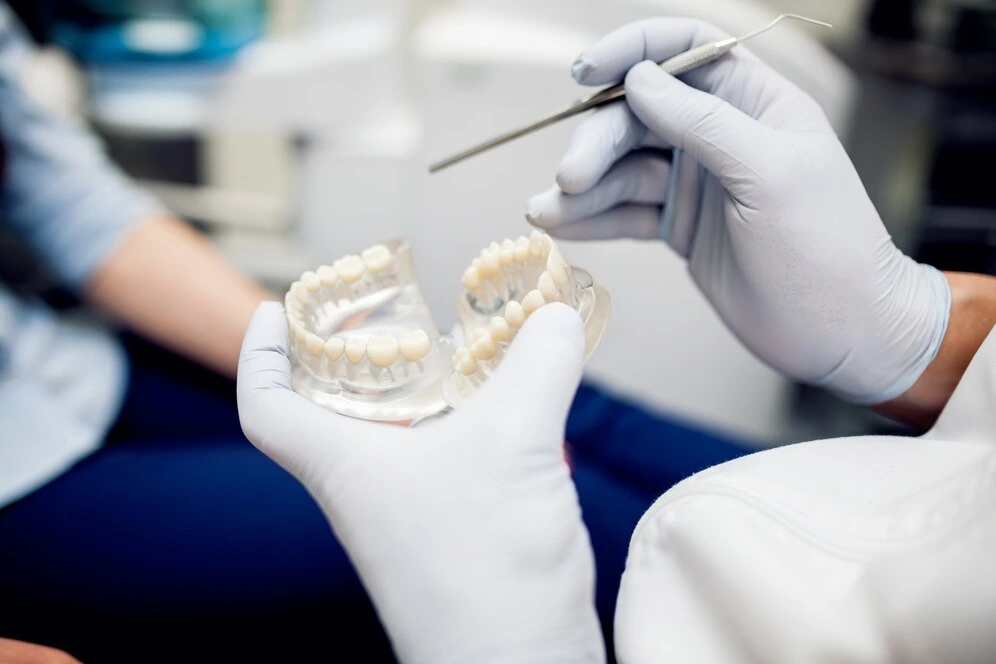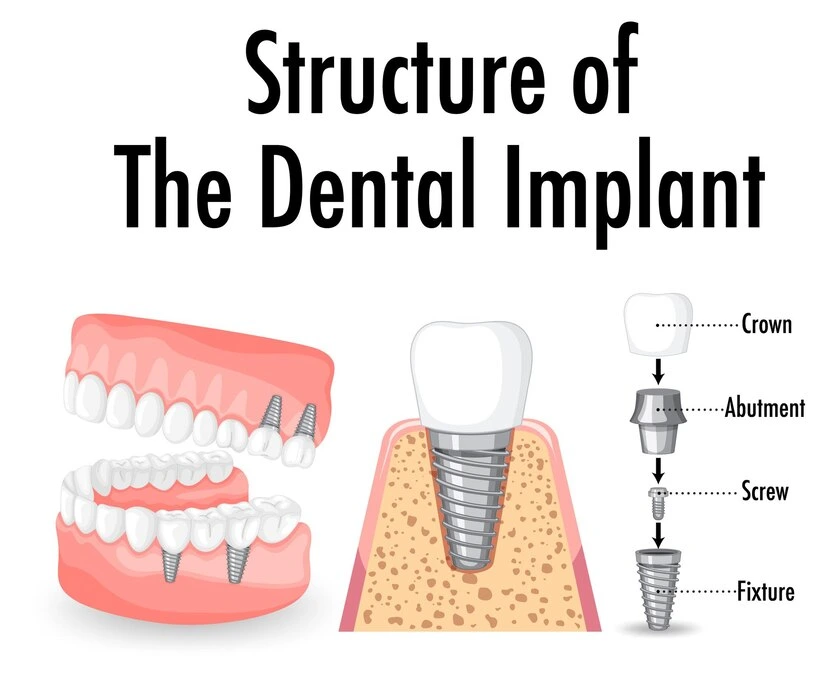
Implants have now become the ultimate solution for missing teeth, providing a more permanent and natural alternative to dentures or bridges. Like every medical procedure, they also have pros and cons. Knowing the pros and cons will help make a correct decision about whether dental implants are an appropriate choice for you.
What are dental implants?
Dental implants are artificial roots, usually made of titanium, surgically placed into the jawbone. They provide a strong foundation for the replacement teeth—either crowns, bridges, or dentures. After the implant has fused into the jawbone with osseointegration, it can become a permanent fixture.
This is an overall process that takes anywhere between 6 to 12 months, depending on personal variables such as healing speed, whether there are any ancillary surgeries to be performed in advance of the restoration, or how complex the case will be.
Advantages of Dental Implants
1. Durability and Longevity
Dental implants are known for being long-term, even up to 20-plus years with proper care. Scientific research has estimated that well over 95% could be regarded as successful after 10 years. By comparison, bridges, which might very well have to be replaced in 5 to 15 years, and dentures, which usually last an average of 7 to 10 years, make implants well worth investing in over the long haul.
2. Bone Loss Prevention
Dental implants have the advantage of preventing the loss of bone. Once teeth are lost, the area of the jawbone no longer receives stimulation and starts to deteriorate. As little as six months after the loss of a tooth, as much as 30% of bone density in the alveolar ridge can be lost. Implants take the place of the function of the natural tooth root and keep the jawbone stimulated to preserve its structure.
3. Natural Look and Feel
Dental implants are designed to be indistinguishable from your existing teeth. An individually tailor-made crown with the shape, size, and colour of your teeth is fit, therefore enabling this section that possesses implants to be essentially very little different from the others around your mouth. Not only that, but it will also not be beat through tooth restoration via implants in having the full chewing force of one’s mouth, hence re-acquiring absolute confidence when one eats, talk, or just simply smile.
4. Better Oral Health
Dental implants contribute to maintaining the alignment of the surrounding teeth, as they fill a gap from a missing tooth, which stops and prevents the neighbouring teeth from shifting or tilting. This decreases the chances of any bite problems and further loss of teeth.


5. Restoring Facial Structure
Bone loss in the jaw makes your face appear sunken and droopy, adding years to your appearance. Implants retain the density of the jawbone, preserving the natural contours of the face, which prevents early ageing.
6. Convenience and Low Maintenance
Unlike dentures, which require adhesives and special cleaning, dental implants are cared for much like natural teeth—through normal brushing, flossing, and dental check-ups—which makes them very viable and practical for those seeking a solution that will last.
Disadvantages of Dental Implants
1. High Initial Cost
Dental implants are way more expensive compared to other alternatives to tooth replacement. In the UK alone, the price for one implant will cost anywhere between £2,000 to £4,000 depending on the complexity of the operation and the material used. While they offer very great value in the long run, it is most certainly beyond the reach of some with its high initial cost.
2. Long Treatment Timeline
The entire dental implant procedure involves many steps, starting from consultation to the surgical placement of the implant, then healing, and ending with the attachment of the final crown. This may take from 6 to 12 months, requiring multiple dental visits and a great deal of patience.
3. Surgical Risks
As with any surgery, there are also the implant placement risks of infection, nerve damage, or failure of implants. Studies have noted that the smoker has a higher percentage failure rate of roughly 11% rather than the 5% in non-smokers.
4. Not for Everyone
Dental implants are by no means the solution for everyone and are often contraindicated for uncontrolled diabetes or some other systemic health effects, such as autoimmune disorders or therapies involving active cancer treatment. Insufficient jawbone density or thickness may also be of major concern and may affect implant placement, requiring possible additional time- and cost-consuming bone graft procedures or sinus lifts.
5. Possible Complications
Even in instances of successful placement, complications do not disappear. Recession in the gum, loosening of the implant, and periodontitis are some of the possibilities at any time after the placement and must be dealt with without any time being wasted to avoid further failure of the implant altogether.
Comparison to Alternatives
Dental Implants vs. Bridges
- Longevity: Implants tend to last longer than bridges.
- Preservation of the tooth: Implants do not jeopardise nearby good teeth, unlike bridges, which need to file down nearby teeth for support.
- Aesthetic Appearance: Implants are more natural-looking and natural-feeling when compared to bridges.
Dental Implants vs. Dentures
- Stability: Implants are fixedly inserted in the jawbone, as opposed to dentures, which may slip or move.
- Functionality: Implants restore full chewing ability, while dentures may limit certain foods.
- Comfort: Implants are like natural teeth, unlike dentures, and do not require adhesives.
Who is a good candidate for dental implants?
Ideal candidates for dental implants are those who are in good oral and general health, with adequate density in the jawbone to support the implant. Non-smokers with healthy gums and no pre-existing medical conditions that could impact healing are the best candidates. However, even those with some bone loss may qualify with the help of preparatory procedures like bone grafting.
Conclusion
Dental implants are among the best dental replacements. They are tough, useful, and dentally good-looking. Unlike other replacements, like bridges and dentures, implants prevent bone loss and maintain good dental health.
However, it is worth considering that the initial cost is much higher, the treatment process takes a long time, and the surgical risks. It’s always best to consult with a qualified dentist whether dental implants are suitable for your needs or if there is any alternative for you.
If you’re ready to take the first step towards restoring your smile, book a consultation with a dental professional today. Your journey to a healthier, more confident you starts here.


